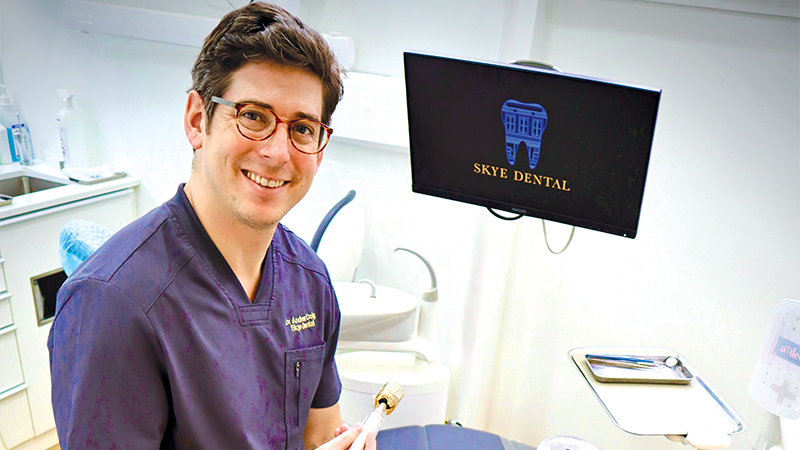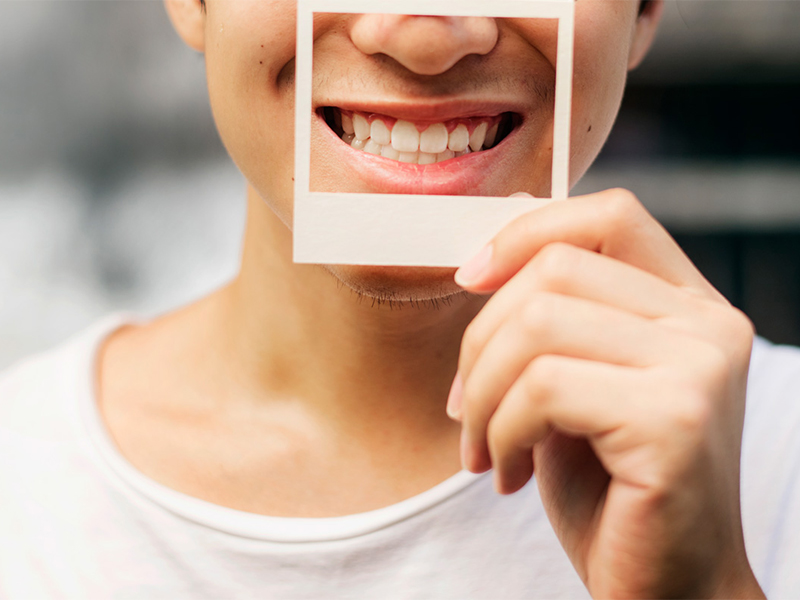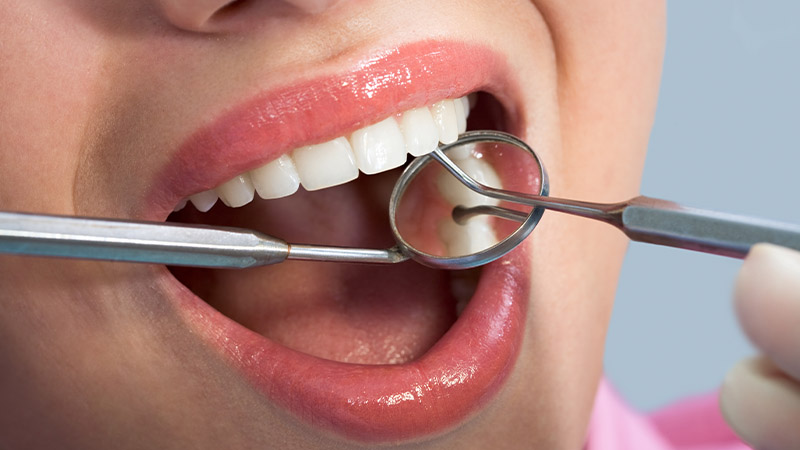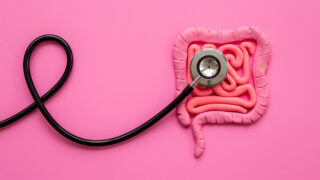Make way, Invisalign (though, we do love you!), there are some new treatments available at dental clinics in Singapore! From new teeth scaling technology to non-toxic ceramic teeth fillings and advancements in dental x-rays, here’s a look at how your teeth can benefit from these modern advancements – and what these Singapore dentists can offer.
#1 A game changer in teeth scaling and polishing
Biofilm is a sticky, colourless coating that covers your teeth. It’s full of bad bacteria that cause gum disease and decay, explains dentist DR ANDREW DOIG of Skye Dental Clinic in Singapore. Plaque is one type of biofilm that builds up in your mouth every day from food and bacteria.
While it’s completely normal for plaque to form, it must be removed daily with flossing and brushing. If we don’t remove it effectively every day, the layer of bacteria builds up and hardens into tartar (dental calculus). This tartar makes it difficult to brush and floss effectively, thus increasing one’s risk of tooth decay and gum disease. And, once tartar has formed, it can’t be removed at home. It can only be removed by a dental professional using special tools for teeth scaling.
About GBT
These tools have traditionally included manual scraping instruments, rubber cups and brushes, and abrasive pastes that have made for many less-than-comfortable experiences. Luckily, there is a more modern approach that cleans biofilm away, and takes the risk of dental decay and gum disease with it – minus the discomfort.
Called Guided Biofilm Therapy (GBT), the teeth scaling technique uses Airflow technology, heated water and a specially designed powder to remove biofilm even in hard-to-reach places, and clean and polish the teeth at the same time.
Though this Swiss technology was developed more than five years ago, it has not really been practised in Singapore until recently, says Dr Andrew. Singapore dentists at dental clinics must be trained and certified as official providers of Guided Biofilm Therapy in order to perform the technique.
Skye Dental is among the few dental clinics in Singapore that currently use GBT – and Dr Andrew says that the teeth scaling technology has been a total game changer in his dental clinic.
“GBT may sound like the name of a Korean pop group that your teen is into, but it’s the new scale and polish,” he says. “It is more effective for the removal of bacteria, hard tartar and stains than traditional methods because it uses a special dye to show all the ‘bad stuff’. There’s no hiding if it’s not cleaned off.”
A teeth scaling treatment with added benefits
There are other advantages of GBT, too. “It’s noninvasive and painless, and causes less sensitivity than the traditional teeth scaling methods. It uses a dedicated water supply that’s heated to 40 degrees Celsius. So, no more cold water on sensitive teeth!” says Dr Andrew.
“It’s also safer and scientifically proven not to damage your enamel, like the old-fashioned, abrasive polishing pastes, rubber cups and uncomfortable scratchy instruments do.”
What’s more, the teeth scaling and polishing procedure is gentle enough for anyone, including kids. “I find Guided Biofilm Therapy particularly good for children and those with braces or Invisalign, as it helps identify brushing shortcomings and gives us an opportunity to improve them. The bonus is that it’s completely painless,” says Dr Andrew. “In fact, patients have said that it’s more like a spa experience than a cleaning!”
Dr Andrew routinely uses GBT for all of his patients, including those undergoing orthodontic treatment by his wife, Dr Eide. The entire teeth scaling process takes around 30 to 60 minutes, and can work perfectly as part of a routine dental cleaning every six months.
Skye Dental
38 Club Street | 6980 5751 | skyedental.sg
#2 Dental clinics that can redesign your smile
Non-verbal communication plays a huge role in how we connect with others. A simple smile can go a long way in facilitating positive communication and influencing outcomes! Digital Smile Design (DSD), which uses modern technology and software to streamline the creation of the perfect smile, has been making a splash in the field of aesthetic dentistry.
Smilefocus is one of the dental clinics in Singapore that offer DSD. Through detailed analysis utilising inputs from scanners and photographs, this treatment provides a range of solutions and precise predictions for smile enhancements. It can pinpoint even the smallest adjustments needed. This innovative approach allows Singapore dentists and patients to collaboratively design a smile that complements the patient’s unique facial features and dental structure.
Indeed, Digital Smile Design can address a variety of aesthetic and structural issues. They include tooth discolouration, spacing and alignment problems, tooth proportions, gum line corrections, and even complete smile makeovers. The process begins with an initial consultation with your Singapore dentist to discuss desires and expectations, followed by a smile simulation using specialised software. This leads to a personalised treatment plan incorporating procedures like orthodontics, veneers, crowns, or implants. Final adjustments are made to ensure precision before treatment implementation.
The many benefits of DSD
The Smilefocus team says that the enhanced accuracy of Digital Smile Design allows the design process to be tailored to individual dental and facial characteristics. Meanwhile, predictable outcomes are ensured through visual previews that allow for adjustments before treatment begins. This enhanced communication between the dentist and patient then leads to higher satisfaction. Plus, being able to visualise future smiles boosts patient confidence in their treatment decisions too.
This treatment offers a precise and personalised way to upgrade your smile while balancing both aesthetics and function. What’s more, the interactive nature of DSD ensures that patients are engaged and satisfied with the projected outcomes.
Smilefocus
#08-02/03 and #08-07/08 Camden Medical Centre, 1 Orchard Boulevard
6733 9882 | smilefocus.com.sg
#3 Take digital snaps of your teeth
According to DR MATTHEW WONG of Elements Dental Clinic in Singapore, an essential part of a patient’s journey is digital dental photographs. It’s a complimentary service that is used in communicating with patients about their dental health. It enables them to be informed and involved in the decision-making of their treatment. Dental photographs achieve the following:
- Show the patient what work was done and what the final result looks like;
- Allow the dental clinic to review the work and document steps that were done should the patient have to relocate and transfer their care to another dentist in the future;
- Act as a tool for communication between the clinic and their patients, and between anyone in the dental team that will be involved with the care of the patients such as external dental and medical specialists, dental technicians and ceramists; and
- Provide clinical documentation of the external condition of teeth for medico-legal reasons.
Informed treatments with digital dental photography
Dr Wong adds that dental photography is entirely safe with no risk of radiation. Plus, the photo be viewed on a screen almost immediately after it is taken. This Singapore dentist uses the photos for clear explanation about areas of interest or concern. In smile makeovers, patients can analyse their current smile and simulate how their dream smile could look, all with dental photographs. In a routine teeth filling, a closeup photo of the damaged tooth acts as a baseline record of the tooth’s condition. During treatment, photographs are taken to document every step and a final photo is taken once filling is completed.
The most valuable thing about dental photography is active monitoring of dental conditions such as wear and tear, cracks, decay or infection over a period of time. Photos taken annually at dental clinics and compared side by side can help patients to clearly compare their dental condition.
Elements Dental
895 Bukit Timah Road
6463 2830 | FB: @ElementsDentalSG | IG: @elementsdentalsg
#4 Get dental x-rays when visiting your Singapore dentist
The team at Align Dental Surgery clinic understand the importance of accurate diagnostics and personalised treatment plans. Specifically, their imaging solutions, the Orthophos SL 3D and the Heliodient Plus dental x-ray machines, are designed to produce high-quality and detailed scans with minimal radiation exposure that ensures patient safety.
Different dental x-rays and their benefits
Bitewing
Purpose: Detect tooth decay between teeth and beneath existing teeth fillings.
Benefit: Early detection of cavities, allows early intervention, preventing the need for root canal treatment.
OPG (Orthopantomogram)
Purpose: Examine wisdom teeth, diagnose tumours and cysts, identify gum disease and problematic teeth and monitor eruption patterns of unerupted permanent teeth in children. It allows for interceptive orthodontics treatment at an early age, such as Invisalign First.
Benefit: Provides a comprehensive view of the entire dentition and identifies areas needing further investigation.
Cone Beam CT/ 3D imaging
Purpose: Essential for complex cases requiring detailed diagnostics.
- Wisdom Teeth Surgery: Assesses proximity to nerves, reducing surgical risks.
- Implant Surgery: Facilitates precise planning by evaluating bone dimensions and surrounding structures.
- Invisalign: Ensures teeth move correctly within the bone, preventing complications.
- Root Canal: Identifies hidden canals for thorough cleaning and successful treatment.
Benefit: Detailed dental x-ray helps visualise hidden structures, enhancing diagnostic accuracy and treatment planning. Whether it’s a routine dental check, planning surgeries, assessing jaw or sinus issues, Align Dental Surgery says that its dental x-ray imaging solutions can provide invaluable insights for customised treatment plans.
Align Dental Surgery
#01-07/08/09 Forum The Shopping Mall, 583 Orchard Road
6773 7088 | WhatsApp 8877 0788 | aligndentalsurgery.com
#5 Swap silver for ceramic teeth fillings
If you’ve got old-school amalgam teeth fillings, or “silver fillings”, you might want to consider replacing them with tooth-coloured ones for a more natural look. Dental surgeon DR THEAN TSIN PIAO of Aesthete Smilestudio recommends choosing composite or stronger ceramic teeth fillings. Both are tooth-coloured, which means they can be closely matched to the shade of existing teeth. This creates a more aesthetically pleasing appearance than the silver metal look.
In terms of sturdiness, resin composite teeth fillings, he says, are just as durable as the metal counterparts. Plus, they do not expand or contract to changes in temperature like amalgam teeth fillings can.
More reason to go metal-free at dental clinics
Aesthetics aside, it’s advisable that amalgam fillings be replaced for health reasons, too, says Dr Thean.
Amalgam teeth fillings are made up of 50 percent mercury and a mix of other metals. The mercury in these fillings has been shown to be harmful to both the human body and the environment. “The mercury from amalgam fillings gets released over time, emitting a vapour that’s inhaled and absorbed into the bloodstream. This is thought to have damaging effects on the organs, particularly the brain, kidney, liver, lungs and gastrointestinal tract,” he says.
For this reason, groups such as the World Health Organisation, World Dental Federation and International Academy of Oral Medicine and Toxicology (IAOMT) defend the decision to phase out amalgam use in accordance with the Minamata Convention on Mercury – a global agreement that aims to reduce the negative impact of mercury on the environment and human health.
As a member of the IAOMT, our dental clinic in Singapore has been supporting amalgam-free treatment for 20 years now. In fact, Dr Thean says that many of the dental clinic’s patients who became aware of the possible health risks have chosen to come in and get their existing amalgam teeth fillings removed and replaced immediately.
“If you have existing amalgam fillings and want to remove them, do make sure to see a Singapore dentist who is able to do it safely.”
Aesthete Smilestudio
#03-01A Singapore Land Tower, 50 Raffles Place
6438 3811 | aesthetesmilestudio.com
This article on dental clinics in Singapore first appeared in the July 2024 edition of Expat Living. You can purchase the latest issue or subscribe, so you never miss a copy!
To make the most of living in Singapore, read our latest City Guide here for free!
Don't miss out on the latest events, news and
competitions by signing up to our newsletter!
By signing up, you'll receive our weekly newsletter and offers which you can update or unsubscribe to anytime.








